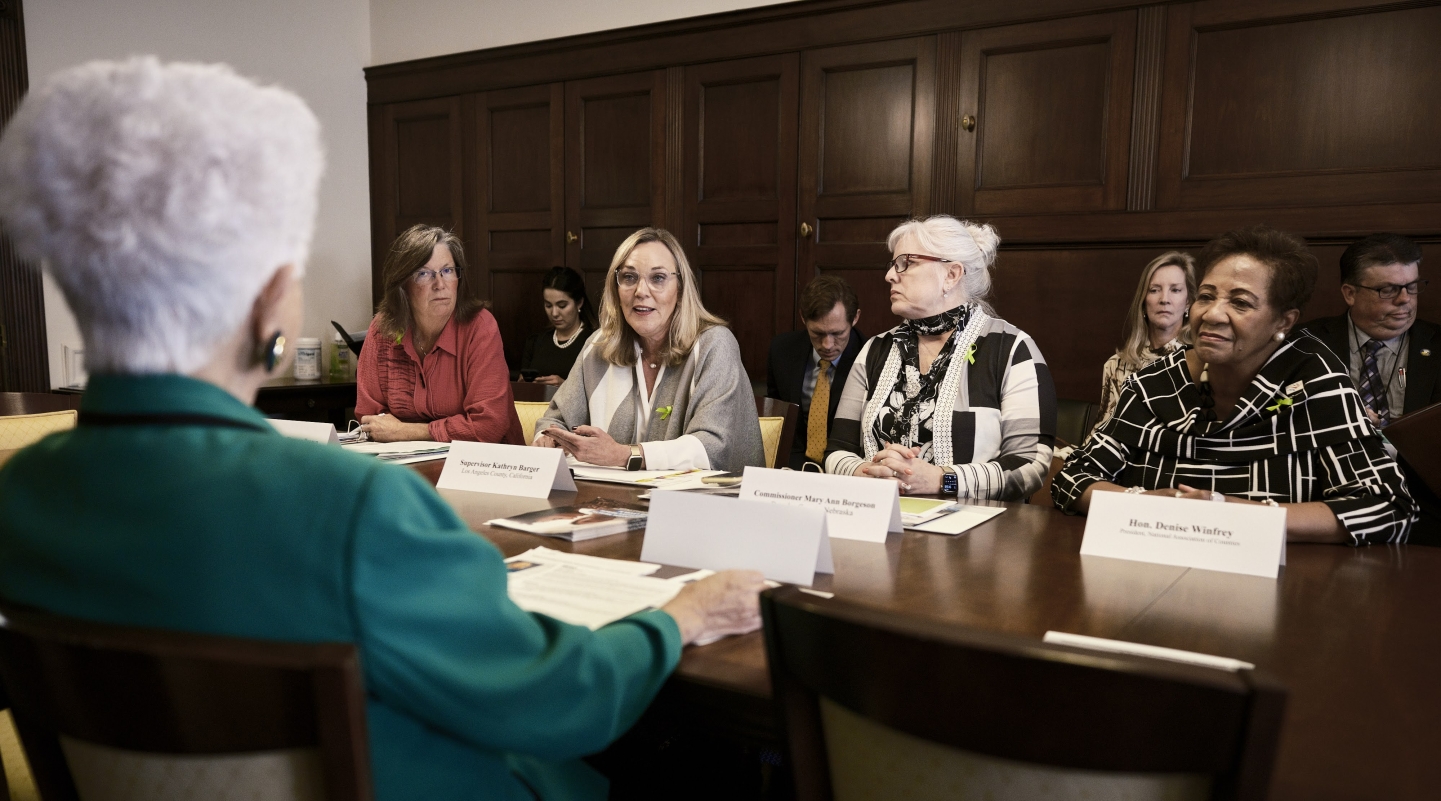County Countdown – April 7, 2025
Upcoming Events
Related News

Every other week, NACo's County Countdown reviews top federal policy advocacy items with an eye towards counties and the intergovernmental partnership.
Budget reconciliation could reshape county services
Budget reconciliation remains the top item on our radar screen, with significant impacts expected for counties. Congress is moving forward with competing budget proposals that could impact programs related to health, infrastructure and public safety.
- New Senate plan: Sets a $1.5 trillion tax cap and includes a $5 trillion debt ceiling increase – an unprecedented shift in fiscal policy.
- House plan: Proposes $4.5 trillion in deficit reduction and $1.5 trillion in spending cuts, potentially affecting Medicaid and county services.
- County advocacy: NACo is undertaking extensive Hill outreach to protect key local priorities.
Major HHS restructuring announced
The U.S. Department of Health and Human Services announced last month that it will consolidate divisions, cut jobs and restructure services, impacting how counties interact with federal health programs.
- New agency structure: Twenty-eight divisions become 15, regional offices shrink from 10 to five and 20,000 jobs will be cut.
- Service disruptions: Counties may face delays in funding, support and regulatory input as a result of this transition.
- Reduced engagement: New policy limits public comment to legally required instances, diminishing local voices.
Federal rulemaking shifts for Waters of the U.S.
From climate to clean water, regulatory changes are underway during the Trump administration’s first 100 days – many with direct county implications.
- WOTUS narrowed: New EPA and Army Corps guidance for Waters of the U.S. limits federal jurisdiction to wetlands with direct surface connections.
- Infrastructure impact: Stormwater, green infrastructure and water reuse systems could be affected.
- Ongoing advocacy: NACo insists local perspectives be reflected in all new rulemaking, as counties are both regulators and regulated when it comes to WOTUS.
Executive order targets county-run elections
A new executive order proposes major changes to election rules that would significantly affect county election officials – many of whom manage elections in their states.
- Key mandates: The executive order includes calling for proof of citizenship for voter registration, making ballots due by Election Day and implementing Department of Homeland Security voter roll reviews.
- Tied to federal funding: States must show “reasonable steps” to secure elections or risk losing funding.
- Local burden: Counties must adjust systems and staffing with limited resources ahead of 2026 elections.
Municipal bonds under threat
NACo is working to protect the tax-exempt status of municipal bonds – an essential tool for financing local infrastructure.
- Big cost risk: Repealing the exemption would raise borrowing costs by $823 billion.
- Wide usage: Over 61,000 small projects under $10 million used tax-exempt bonds in the past decade.
- New support: A “Dear Colleague” letter led by Congressman Don Bacon is circulating – counties should ask their congressional representatives to sign on.
Related News

NOAA outlines help for counties navigating drought’s growing risks
In April, the National Integrated Drought Information System will launch the Mid-Atlantic Drought Early Warning System, which will help county officials allocate resources and attention to mitigate drought-related disasters.

House Agriculture Committee introduces 2026 Farm Bill
On February 13, House Agriculture Committee Chairman G.T. Thompson (R-Pa.-15) introduced the House version of the 2026 Farm Bill, the Farm, Food, and National Security Act of 2026.
Upcoming Events

Cyber Resilience in County Finance: Protecting What Matters Most
Friday, March 6, 2026 | 2:00 p.m. - 3:00 p.m. ET
Cyber threats are increasingly targeting public sector finance teams and resilience starts with understanding the risks. In this webinar, Peter Forsgren of three+one shares real stories from ethical hackers to explore social engineering, emerging cybersecurity threats and practical steps counties can take to protect their people, data and financial systems.
This webinar is brought to you by NACo EDGE, establishing people, purchasing, and performance cost-saving solutions that can be applied to counties nationwide. EDGE is owned by NACo, advised by county leaders and 100% focused on solutions for U.S. Counties. Learn more about NACo EDGE here.
For more information, visit the event page!

NACo Policy Insider Webinar Series: Understanding the Federal Landscape for Counties, March 12
Join NACo for a bi-weekly webinar offering an overview of the full federal policy landscape impacting counties.

NACo Policy Insider Webinar Series: Understanding the Federal Landscape for Counties, March 26
Join NACo for a bi-weekly webinar offering an overview of the full federal policy landscape impacting counties.






